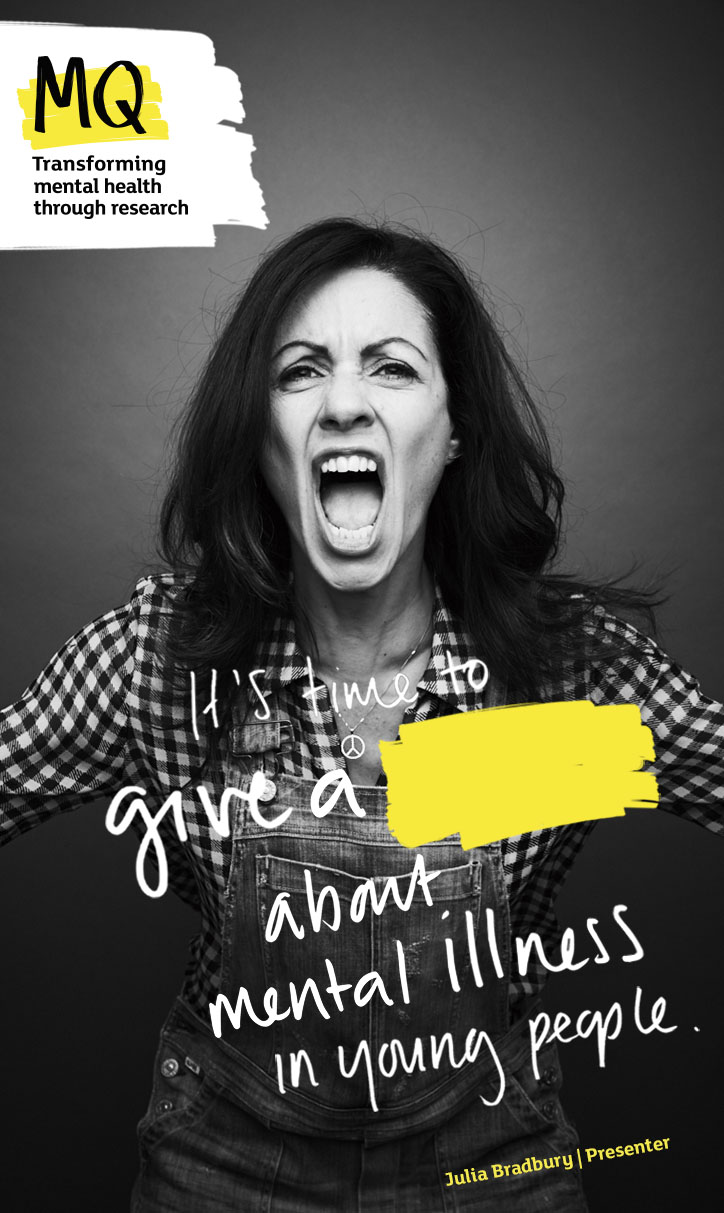What do you do in your day-to-day life to give your mind a boost? For TV presenter and walking fan Julia Bradbury, there’s little that beats getting outdoors for a bracing countryside hike or stroll around town with a friend in tow (you can find some of her route recommendations here).
To mark today’s World Mental Health Day, Julia is supporting MQ to encourage people to find out a bit more about mental health research, and share some of the everyday things she does to support her own wellbeing.
Here, the former Countryfile and Watchdog presenter, 47, tells us why she’s such a fan of walking, why children and young people’s mental health is a crucial concern too, and how simple, everyday habits can make a big difference when it comes to supporting our health, inside and out…
Walking engages the body and brain…
“Walking is known to change the way we think; there’s something about the motion of walking that connects with the brain, enhances our mood and engages the body while giving us scope for reflection. It doesn’t have to be in the countryside either – but if you can find some green space on your urban walk, that’s been shown to have a positive impact on the way we think and feel as well.
“When I need to think a problem through or I’m feeling a bit low, I’ll take a walk. Mostly it’s without music, if I want to really reflect and ‘talk to myself’, but if it’s just exercise and escape I’m after, I plug in the earbuds (house music, before you ask, something with a repetitive beat to motivate me to walk faster and stronger!).
“If I’m in London, I’ll sometimes walk solo once a week, and then with a friend a couple of days a week to talk about politics, news and discuss world events. There’s been a lot to talk about recently…”
You always feel better after exercise…
“When I’m in a bad mood, I really try and push myself to get out there and take a walk or do a yoga class or something, because it genuinely makes me feel better afterwards. The worst thing you can do is stew. Sometimes I get knackered travelling for work – planes and long journeys take it out of me more now I’m older – and sometimes the last thing you want to do is contort your body or push yourself. I find that once I get back into the routine of doing a mixture of exercise through the week, then I crave it if I skip a few sessions.”
A few minutes’ proactive thinking time each day helps stay on top of things…
“I spend five minutes every day thinking about all the things I’m grateful for (to come, or from yesterday) and make a plan for the day ahead. I wouldn’t call it meditation, but I suppose it’s a type of…
“Some days I’m just in a bad mood and that’s it! We all have those days. If it goes beyond a day, I call a good friend of mine who’s a really good listener. Nurturing and valuing friendships is so important, and a very underestimated part of maintaining a good life balance and your mental health.”

We need to look out for children’s mental health…
“Social media and email have changed our approach to work and life in an unhealthy way. People expect an answer straight away and there is no down-time any more. I really try and carve out screen-free time every day. I interviewed a child psychologist last year for Radio 4, who described our children as the ‘canaries down the mine’ when it comes to the impact of social media, and it’s frightening.
“Self-harming is at epidemic levels, and MQ have identified that three children in every classroom live with a mental illness. I worry so much about the mental health of my children growing up in this alternative universe, where kids sit on beds texting each other instead of talking, and ‘rate’ each other on Instagram.”

We all need to cut ourselves some slack…
“I’m at my most productive when I’ve had a good night’s sleep (seven-eight hours), which is known to be the magic re-jiggler of our entire bodies; repairing wrongs, flushing out the bad bits in the brain and enhancing our moods. We should be kind to ourselves, and try really hard to cut ourselves some slack and dedicate a bit of every day to ‘me time’.
People will argue that they don’t have that luxury – but I think in the longer- term, you do better for you and your family if you’re fit, healthy and happy (at least some of the time). Mental health is as important as physical health, and just like our bodies – it requires some maintenance.”
For more information about mental health research, see mqmentalhealth.org





